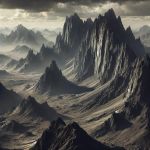Khargaath Range: Difference between revisions
No edit summary |
No edit summary |
||
| (2 intermediate revisions by the same user not shown) | |||
| Line 20: | Line 20: | ||
== Overview == | == Overview == | ||
The '''Khargaath Range''' is a formidable mountain range located to the west of the [[Citadel Mountains]] in the realm of | The '''Khargaath Range''' is a formidable mountain range located to the west of the [[Citadel Mountains]] in the realm of [[Terasil]]. These treacherous peaks form the western edge of Sanctuary Vale, and they are known for their sharp cliffs, deep ravines, and jagged terrain. The mountains are remnants of ancient volcanic activity, and their harsh environment has made them largely impassable to most forms of travel. The town of [[Djes-Val]] is located on the eastern slopes, offering a safe haven from the dangerous surroundings. | ||
== Etymology == | == Etymology == | ||
| Line 28: | Line 28: | ||
The Khargaath Range forms a crescent moon across from the Citadel Mountains on the western and norther boundaries of Sanctuary Vale. The range is marked by steep cliffs, deep ravines, and treacherous slopes, making passage through the mountains difficult. The volcanic roots of the range are evident in the blackened rock faces and sharp spires that dominate the landscape. | The Khargaath Range forms a crescent moon across from the Citadel Mountains on the western and norther boundaries of Sanctuary Vale. The range is marked by steep cliffs, deep ravines, and treacherous slopes, making passage through the mountains difficult. The volcanic roots of the range are evident in the blackened rock faces and sharp spires that dominate the landscape. | ||
* | * Major Peaks: The highest peak in the Khargaath Range is Mount Kharth, rising to approximately 13,000 feet. | ||
== Geology == | == Geology == | ||
The Khargaath Range is a product of ancient volcanic activity, which shaped the mountains' jagged features and mineral-rich landscape. The range is primarily composed of basalt and obsidian, remnants of the eruptions that formed the range millions of years ago. | The Khargaath Range is a product of ancient volcanic activity, which shaped the mountains' jagged features and mineral-rich landscape. The range is primarily composed of basalt and obsidian, remnants of the eruptions that formed the range millions of years ago. | ||
* | * Volcanic Origins: The range’s volcanic past is evident in the dark, glassy stone that covers much of the terrain. The minerals present in the range are rich in iron, sulfur, and obsidian, making the region dangerous and inhospitable for most life forms. | ||
* | * Geological Formation: The range's complex geology consists of igneous rock, basalt formations, and collapsed calderas, creating a highly unstable terrain prone to rockslides and sudden shifts. | ||
== Climate == | == Climate == | ||
The climate in the Khargaath Range is harsh and unforgiving, with temperatures varying greatly between day and night. | The climate in the Khargaath Range is harsh and unforgiving, with temperatures varying greatly between day and night. | ||
* | * Lower Slopes: The lower slopes experience a cool, arid climate, with occasional storms and high winds. Vegetation is sparse, and only the hardiest plants and shrubs can survive in this environment. | ||
* | * Higher Elevations: As one climbs higher into the range, the climate becomes colder and more extreme, with fierce winds, snow, and the occasional volcanic ash cloud. The peaks are often covered in a thin layer of snow year-round, and visibility can be poor due to frequent storms. | ||
== Ecology == | == Ecology == | ||
| Line 48: | Line 48: | ||
Vegetation in the Khargaath Range is scarce but highly adapted to the rugged volcanic terrain. | Vegetation in the Khargaath Range is scarce but highly adapted to the rugged volcanic terrain. | ||
* | * Vorthul-bloom – A hardy flower that thrives in volcanic soil, its dark crimson petals intensify in color when exposed to ash. It is used by the Orasians in ritual offerings and protective sigils. | ||
* | * Kharthul-brush – A spiny, deep-rooted shrub that clings to rocky crevices, drawing moisture from the stone itself. Its tough, needle-like leaves are used in incense and purification rites. | ||
* | * Ythrak-grass – A fire-resistant, ember-colored grass found on the arid lower slopes. It is commonly gathered for ceremonial pyres and smoke-drying preservation techniques. | ||
=== Fauna === | === Fauna === | ||
The wildlife of the Khargaath Range has evolved to withstand the harsh volcanic environment, with many species developing stone-like adaptations or fire-resistant traits. | The wildlife of the Khargaath Range has evolved to withstand the harsh volcanic environment, with many species developing stone-like adaptations or fire-resistant traits. | ||
* | * Vorthul-claw – A wolf-like predator with crystalline claws that allow it to scale sheer cliffs with ease. Known for its stealth and ability to blend seamlessly into the volcanic terrain. | ||
* | * Zarvok Drake – A small, fire-infused drake capable of expelling bursts of molten heat. These creatures nest in high-altitude crevices and are revered as guardians of the peaks in Orasian folklore. | ||
* | * Thalgran Beast – A massive, stone-skinned bovid that roams the lower slopes, its obsidian-hued fur and heavy, mineral-infused hooves allowing it to crush rock beneath its weight. These creatures are symbols of resilience in Orasian culture. | ||
== See Also == | == See Also == | ||
| Line 66: | Line 66: | ||
== Gallery == | == Gallery == | ||
<gallery widths="250" heights="150"> | <gallery widths="250" heights="150"> | ||
File:Khargaath_Range.jpg| | File:Khargaath_Range.jpg|Khargaath Range - A view of the jagged volcanic peaks. | ||
File:Djes-Val.jpg| | File:Djes-Val.jpg|Djes-Val - The town nestled at the eastern slope of the Khargaath Range. | ||
</gallery> | </gallery> | ||
[[Category:Mountain range]] | |||
Latest revision as of 01:19, 13 February 2025
Overview
The Khargaath Range is a formidable mountain range located to the west of the Citadel Mountains in the realm of Terasil. These treacherous peaks form the western edge of Sanctuary Vale, and they are known for their sharp cliffs, deep ravines, and jagged terrain. The mountains are remnants of ancient volcanic activity, and their harsh environment has made them largely impassable to most forms of travel. The town of Djes-Val is located on the eastern slopes, offering a safe haven from the dangerous surroundings.
Etymology
The name "Khargaath" is believed to derive from an ancient word meaning "remnants of fire" or "burned earth", a reference to the volcanic origins of the range. The Orasians see the Khargaath Range as a boundary, both geographically and spiritually, marking the limits of the Sanctuary Vale and the entrance to more hostile lands.
Geography
The Khargaath Range forms a crescent moon across from the Citadel Mountains on the western and norther boundaries of Sanctuary Vale. The range is marked by steep cliffs, deep ravines, and treacherous slopes, making passage through the mountains difficult. The volcanic roots of the range are evident in the blackened rock faces and sharp spires that dominate the landscape.
- Major Peaks: The highest peak in the Khargaath Range is Mount Kharth, rising to approximately 13,000 feet.
Geology
The Khargaath Range is a product of ancient volcanic activity, which shaped the mountains' jagged features and mineral-rich landscape. The range is primarily composed of basalt and obsidian, remnants of the eruptions that formed the range millions of years ago.
- Volcanic Origins: The range’s volcanic past is evident in the dark, glassy stone that covers much of the terrain. The minerals present in the range are rich in iron, sulfur, and obsidian, making the region dangerous and inhospitable for most life forms.
- Geological Formation: The range's complex geology consists of igneous rock, basalt formations, and collapsed calderas, creating a highly unstable terrain prone to rockslides and sudden shifts.
Climate
The climate in the Khargaath Range is harsh and unforgiving, with temperatures varying greatly between day and night.
- Lower Slopes: The lower slopes experience a cool, arid climate, with occasional storms and high winds. Vegetation is sparse, and only the hardiest plants and shrubs can survive in this environment.
- Higher Elevations: As one climbs higher into the range, the climate becomes colder and more extreme, with fierce winds, snow, and the occasional volcanic ash cloud. The peaks are often covered in a thin layer of snow year-round, and visibility can be poor due to frequent storms.
Ecology
Despite its treacherous environment, the Khargaath Range supports a limited but unique ecosystem. The flora and fauna here are specially adapted to survive in the harsh, rocky landscape.
Flora
Vegetation in the Khargaath Range is scarce but highly adapted to the rugged volcanic terrain.
- Vorthul-bloom – A hardy flower that thrives in volcanic soil, its dark crimson petals intensify in color when exposed to ash. It is used by the Orasians in ritual offerings and protective sigils.
- Kharthul-brush – A spiny, deep-rooted shrub that clings to rocky crevices, drawing moisture from the stone itself. Its tough, needle-like leaves are used in incense and purification rites.
- Ythrak-grass – A fire-resistant, ember-colored grass found on the arid lower slopes. It is commonly gathered for ceremonial pyres and smoke-drying preservation techniques.
Fauna
The wildlife of the Khargaath Range has evolved to withstand the harsh volcanic environment, with many species developing stone-like adaptations or fire-resistant traits.
- Vorthul-claw – A wolf-like predator with crystalline claws that allow it to scale sheer cliffs with ease. Known for its stealth and ability to blend seamlessly into the volcanic terrain.
- Zarvok Drake – A small, fire-infused drake capable of expelling bursts of molten heat. These creatures nest in high-altitude crevices and are revered as guardians of the peaks in Orasian folklore.
- Thalgran Beast – A massive, stone-skinned bovid that roams the lower slopes, its obsidian-hued fur and heavy, mineral-infused hooves allowing it to crush rock beneath its weight. These creatures are symbols of resilience in Orasian culture.
See Also
Gallery
-
Khargaath Range - A view of the jagged volcanic peaks.
-
Djes-Val - The town nestled at the eastern slope of the Khargaath Range.

